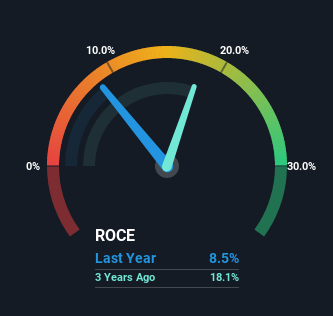
To find a multi-bagger stock, what are the underlying trends we should look for in a business? Typically, we'll want to notice a trend of growing return on capital employed (ROCE) and alongside that, an expanding base of capital employed. Put simply, these types of businesses are compounding machines, meaning they are continually reinvesting their earnings at ever-higher rates of return. So when we looked at Endymed (TLV:ENDY) and its trend of ROCE, we really liked what we saw.
Return On Capital Employed (ROCE): What Is It?
For those who don't know, ROCE is a measure of a company's yearly pre-tax profit (its return), relative to the capital employed in the business. The formula for this calculation on Endymed is:
Return on Capital Employed = Earnings Before Interest and Tax (EBIT) ÷ (Total Assets - Current Liabilities)
0.085 = US$1.4m ÷ (US$20m - US$3.5m) (Based on the trailing twelve months to December 2022).
Thus, Endymed has an ROCE of 8.5%. In absolute terms, that's a low return and it also under-performs the Medical Equipment industry average of 11%.
Check out our latest analysis for Endymed

Historical performance is a great place to start when researching a stock so above you can see the gauge for Endymed's ROCE against it's prior returns. If you'd like to look at how Endymed has performed in the past in other metrics, you can view this free graph of past earnings, revenue and cash flow.
What Does the ROCE Trend For Endymed Tell Us?
Endymed has recently broken into profitability so their prior investments seem to be paying off. About five years ago the company was generating losses but things have turned around because it's now earning 8.5% on its capital. And unsurprisingly, like most companies trying to break into the black, Endymed is utilizing 397% more capital than it was five years ago. This can tell us that the company has plenty of reinvestment opportunities that are able to generate higher returns.
One more thing to note, Endymed has decreased current liabilities to 18% of total assets over this period, which effectively reduces the amount of funding from suppliers or short-term creditors. So shareholders would be pleased that the growth in returns has mostly come from underlying business performance.
The Bottom Line
Long story short, we're delighted to see that Endymed's reinvestment activities have paid off and the company is now profitable. Since the stock has only returned 19% to shareholders over the last five years, the promising fundamentals may not be recognized yet by investors. Given that, we'd look further into this stock in case it has more traits that could make it multiply in the long term.
Endymed does come with some risks though, we found 3 warning signs in our investment analysis, and 1 of those is a bit unpleasant...
If you want to search for solid companies with great earnings, check out this free list of companies with good balance sheets and impressive returns on equity.
Valuation is complex, but we're here to simplify it.
Discover if Endymed might be undervalued or overvalued with our detailed analysis, featuring fair value estimates, potential risks, dividends, insider trades, and its financial condition.
Access Free AnalysisHave feedback on this article? Concerned about the content? Get in touch with us directly. Alternatively, email editorial-team (at) simplywallst.com.
This article by Simply Wall St is general in nature. We provide commentary based on historical data and analyst forecasts only using an unbiased methodology and our articles are not intended to be financial advice. It does not constitute a recommendation to buy or sell any stock, and does not take account of your objectives, or your financial situation. We aim to bring you long-term focused analysis driven by fundamental data. Note that our analysis may not factor in the latest price-sensitive company announcements or qualitative material. Simply Wall St has no position in any stocks mentioned.
About TASE:ENDY
Endymed
Provides energy based medical aesthetic treatment systems for the professional and consumer markets in North America, Europe, the Middle East, Africa, Asia, Oceania, Latin America, and internationally.
Flawless balance sheet low.

